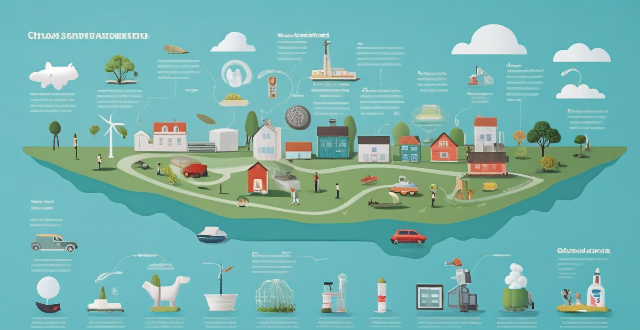Climate change and ecosystem services are interconnected phenomena that impact our planet. Climate change affects ecosystem services such as water regulation, food production, air purification, and recreational opportunities. Conversely, ecosystem services play a crucial role in mitigating climate change by promoting carbon sequestration, conserving biodiversity, and supporting sustainable land use practices. To address these challenges effectively, it is essential to consider both climate change and ecosystem services holistically and work towards integrated solutions that protect our planet's natural systems while meeting human needs sustainably.

Introduction
Climate change and ecosystem services are two interconnected phenomena that have significant impacts on our planet. Ecosystem services refer to the benefits that humans derive from ecosystems, such as food, water, air purification, and recreational opportunities. Climate change, on the other hand, is the long-term alteration of global climate patterns caused by human activities, primarily the burning of fossil fuels and deforestation. In this article, we will explore how climate change and ecosystem services interact with each other.
The Impact of Climate Change on Ecosystem Services
Water Regulation
Climate change can affect the availability and quality of water resources in various ways. For example, increased temperatures can lead to higher evaporation rates, reducing the amount of water available for ecosystems and human use. Additionally, changes in precipitation patterns can lead to more frequent and severe droughts or floods, which can damage ecosystems and disrupt water regulation services.
Food Production
Climate change can also impact food production by altering growing conditions for crops and livestock. Higher temperatures and changes in precipitation patterns can reduce crop yields and increase the risk of pests and diseases. This can lead to reduced availability and higher prices for food, affecting both humans and wildlife that rely on these resources.
Air Purification
Ecosystems play a crucial role in purifying the air we breathe by absorbing carbon dioxide and other pollutants. However, climate change can impair this service by altering the composition and functioning of ecosystems. For example, rising temperatures can cause trees to lose their leaves earlier in the season, reducing their ability to capture carbon dioxide during photosynthesis.
Recreational Opportunities
Climate change can also impact recreational opportunities provided by ecosystems. As temperatures rise and weather patterns become more extreme, some areas may become less suitable for outdoor activities like hiking or camping. Additionally, changes in ecosystem structure and functioning can affect the diversity and abundance of species that people enjoy observing or interacting with during recreation activities.
The Impact of Ecosystem Services on Climate Change
Carbon Sequestration
Ecosystems play a critical role in mitigating climate change by sequestering carbon dioxide from the atmosphere through photosynthesis. Forests, wetlands, and other vegetation types act as "carbon sinks," storing large amounts of carbon in their biomass and soils. By preserving and restoring these ecosystems, we can help reduce atmospheric concentrations of greenhouse gases and slow down the rate of climate change.
Biodiversity Conservation
Maintaining healthy ecosystems is essential for conserving biodiversity, which plays a vital role in regulating ecosystem processes that help mitigate climate change. For example, diverse plant communities can promote soil health and stability, reducing erosion and helping to store carbon in the soil. Additionally, many species provide important ecological functions, such as pollination or seed dispersal, that contribute to the resilience of ecosystems facing climate change pressures.
Sustainable Land Use Practices
Sustainable land use practices, such as reforestation or sustainable agriculture, can help mitigate climate change by promoting carbon sequestration and reducing greenhouse gas emissions. These practices also support healthy ecosystems that provide essential services like water regulation and food production. By adopting sustainable land use practices, we can help protect both ecosystem services and mitigate climate change simultaneously.
Conclusion
In conclusion, climate change and ecosystem services are closely interconnected phenomena that have far-reaching implications for our planet's future. Climate change can impact ecosystem services by altering water regulation, food production, air purification, and recreational opportunities. Conversely, ecosystem services play a crucial role in mitigating climate change by promoting carbon sequestration, conserving biodiversity, and supporting sustainable land use practices. To address these challenges effectively, it is essential to consider both climate change and ecosystem services holistically and work towards integrated solutions that protect our planet's natural systems while meeting human needs sustainably.